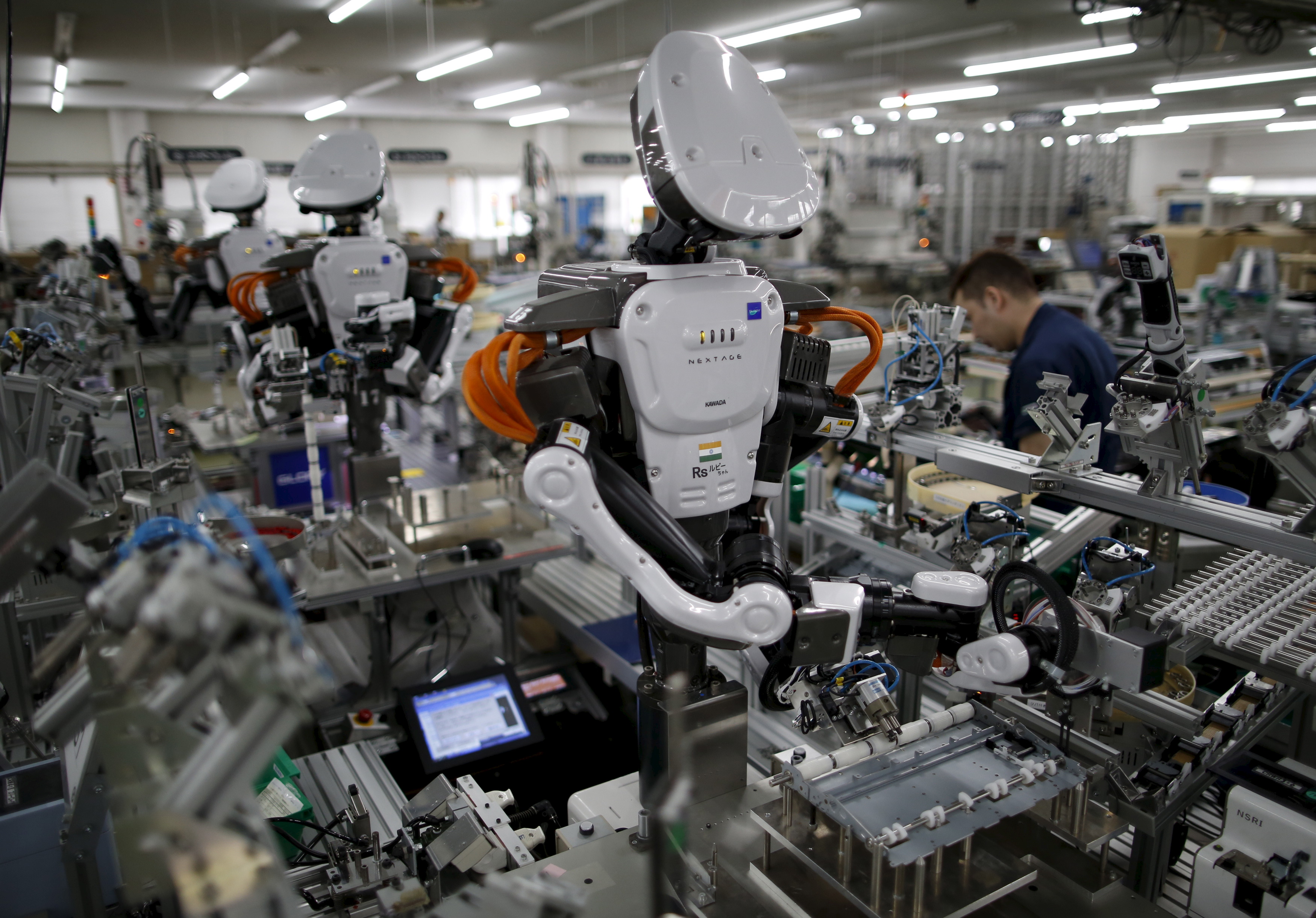The overhyped fantasy of basic income vs. robots
If the robots aren't really rising, is universal basic income really necessary?


Much of universal basic income's allure lies in its elegant simplicity. Replace all welfare programs with government checks for all. At least that's how it basically works in theory.
Of course, implementing a universal basic income scheme — particularly in a large, diverse, kludgy nation like the United States — would likely be anything but simple. (The version Switzerland is voting on next week is additive and wouldn't replace existing programs.) Universal health care sounds pretty straightforward, after all, but ObamaCare is anything but. The only thing the public and policymakers could be sure of would be messy politics and myriad unintended consequences and trade-offs.
Then again, big problems require big solutions — even though they also generate lots of disruption. So if the universal basic income is the big solution, what's the big problem?
The Week
Escape your echo chamber. Get the facts behind the news, plus analysis from multiple perspectives.

Sign up for The Week's Free Newsletters
From our morning news briefing to a weekly Good News Newsletter, get the best of The Week delivered directly to your inbox.
From our morning news briefing to a weekly Good News Newsletter, get the best of The Week delivered directly to your inbox.
Proponents argue there is one: technological unemployment. It's probably no coincidence that wonk enthusiasm for universal basic income in the U.S. is growing along with rising public concern about robots taking our jobs. It's hardly an unfounded fear. Artificial intelligence and robots do seem to be getting ever-more clever and capable. Drones delivering packages. Cars driving themselves. Software winning at Jeopardy! and Go. One widely cited Oxford study estimates that 47 percent of total U.S. employment, "could be automated relatively soon, perhaps over the next decade or two." So no time like the present to get universal basic income up and running so we can work out the kinks, yes?
But what if the robots don't take all our jobs? What if they just change them a lot, at least over the next generation or so?
Maybe the real policy priority should be making sure that workers can do more of what robots can't and a dynamic economy produces a never-ending supply of new jobs for the robots to try and steal. "Journalists and expert commentators overstate the extent of machine substitution for human labor and ignore the strong complementarities that increase productivity, raise earnings, and augment demand for skilled labor," economist David Autor says. Maybe we should race with the machines as opposed to against them, in the metaphor of MIT's Eric Brynjolfsson and Andrew McAfee. As for the weak 2000s job market, Autor thinks a series of one-off economic blows — the bursting of the dot-com and housing bubbles, the financial crisis, and China trade shock — are likelier culprits than automation.
Now that might not be true going forward. Certainly many Silicon Valley technologists reasonably fret about the job-market implications of their handiwork. Startup accelerator Y Combinator announced this week it would launch a short-term, basic-income experiment in Oakland. YC's Sam Altman blogged that "in a world where technology replaces existing jobs and basic income becomes necessary, technological improvements should generate an abundance of resources" to fund such a program.
A free daily email with the biggest news stories of the day – and the best features from TheWeek.com
But there's some reason to think basic income advocates are overstating the risk of tech-driven job loss, at least over the near term. Take that alarming Oxford study. A new analysis from the OECD — an advanced economy think tank — finds only 9 percent of U.S. jobs face "high automatability." Instead of broadly looking at what occupations can be automated, the OECD researchers look at the "task-content" of jobs. Different jobs may contain a mix of tasks, each with varying levels of automation potential.
Business consultancy McKinsey found similar results when it examined some 2,000 individual work tasks and assessed them against current-world tech capabilities. It found that while 45 percent of tasks could be automated, fewer than 5 percent of entire occupations could be. McKinsey sees automation replacing "more routine or repetitive tasks, allowing employees to focus more on tasks that utilize creativity and emotion." (Workers may already know this, which is perhaps why 80 percent of us think our own jobs will "probably" or "definitely" exist in their current forms five decades from now.)
What's more, the OECD estimates — though far lower than the Oxford analysis — may still overstate the level of automation risk since the study only looks at what's technologically possible, not how tech is being used in the real world. The study also ignores both the new jobs tech advancement creates and greater labor demand generated by higher worker incomes through increased productivity.
As with trade, not everyone is a winner with automation, even if it's a net benefit to society. In particular, the OECD study notes that low-skill workers are likely to "bear the brunt" in terms of needing retraining. And this could prove so difficult that policymakers may need to rethink the safety net and more broadly subsidize work. For now, though, the universal basic income remains an idea for the future, and perhaps always will.
James Pethokoukis is the DeWitt Wallace Fellow at the American Enterprise Institute where he runs the AEIdeas blog. He has also written for The New York Times, National Review, Commentary, The Weekly Standard, and other places.
-
 Democrat files to impeach RFK Jr.
Democrat files to impeach RFK Jr.Speed Read Rep. Haley Stevens filed articles of impeachment against Health and Human Services Secretary Robert F. Kennedy Jr.
-
 Constitutional rights are at the center of FBI agents’ lawsuit
Constitutional rights are at the center of FBI agents’ lawsuitIn the Spotlight The agents were photographed kneeling during a racial justice protest
-
 $1M ‘Trump Gold Card’ goes live amid travel rule furor
$1M ‘Trump Gold Card’ goes live amid travel rule furorSpeed Read The new gold card visa offers an expedited path to citizenship in exchange for $1 million
-
 How do you solve a problem like Facebook?
How do you solve a problem like Facebook?The Explainer The social media giant is under intense scrutiny. But can it be reined in?
-
 Microsoft's big bid for Gen Z
Microsoft's big bid for Gen ZThe Explainer Why the software giant wants to buy TikTok
-
 Apple is about to start making laptops a lot more like phones
Apple is about to start making laptops a lot more like phonesThe Explainer A whole new era in the world of Mac
-
Why are calendar apps so awful?
The Explainer Honestly it's a wonder we manage to schedule anything at all
-
 Tesla's stock price has skyrocketed. Is there a catch?
Tesla's stock price has skyrocketed. Is there a catch?The Explainer The oddball story behind the electric car company's rapid turnaround
-
 How robocalls became America's most prevalent crime
How robocalls became America's most prevalent crimeThe Explainer Today, half of all phone calls are automated scams. Here's everything you need to know.
-
 Google's uncertain future
Google's uncertain futureThe Explainer As Larry Page and Sergey Brin officially step down, the company is at a crossroads
-
 Can Apple make VR mainstream?
Can Apple make VR mainstream?The Explainer What to think of the company's foray into augmented reality
